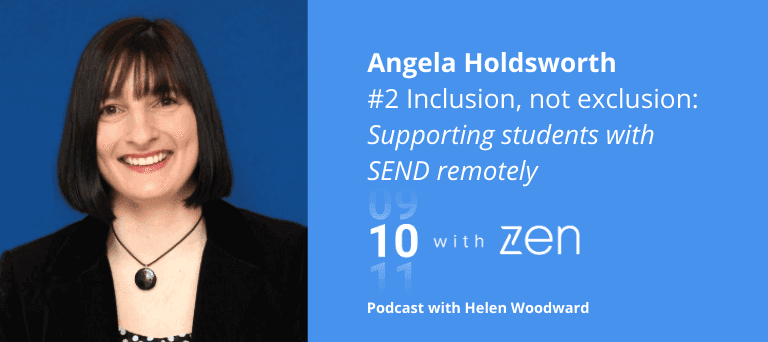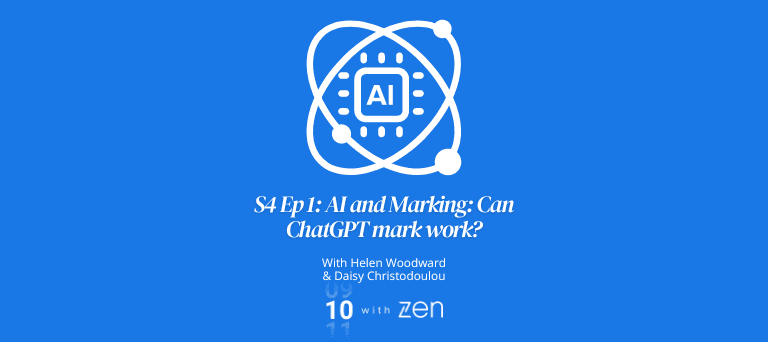2 Feb 2021
Inclusion, Not Exclusion with Angela Holdsworth
Andrew King
5
min read
We’re pleased to share with you Inclusion, Not Exclusion, episode 2 of Zen Educate’s new short podcast series, 10 with Zen. For this episode, Helen Woodward chatted with Angela Holdsworth. As well as being CEO of the Seaview Trust in North West England, Angela is a Regional Representative for nasen (National Association for Special Educational Needs) for Whole School SEND (special educational needs and disabilities), and the Teaching Schools Council National SEND Representative.
Angela touches on the priorities this term for students with SEND, the issues school leaders need to understand to ensure decisions and plans are in the interest of students with SEND, and how communication can be improved with parents and carers.
The priorities for students with SEND this term
Summary: Angela began by pointing out the priorities for students with SEND are much the same as those for all learners. Students with SEND can attend school, but are not always able to, so ensuring access to a balanced blend of learning in school and at home is the priority.
Key insights: Many pupils with SEND will be used to a high level of support when they’re in school, and unfortunately it’s not always possible to provide this in a home setting:
“We need to be thinking about an holistic approach. So when we’re in school, we’re very much thinking ‘whole child’, for our SEND learners. Not just the academic, but also the additional therapies, the additional mental health and wellbeing work that we do.”
Opportunities: Angela emphasised that routine is hugely important for children with SEND. If on a Monday a child more or less knows what to expect in the mornings and afternoons from their week, it can help them to separate ‘school time’ from ‘home time’. Angela recommends that parents or carers talk with school teachers/leaders where possible to get a good idea of what kind of routine a child is used to in school:
“For children who are normally on SEND support, their support can often be slightly more subtle. So it’s important to understand and for the school to talk with the family about what they would normally be doing, and for class teachers to share the specific approaches that work for that child.”
The issues school leaders need to understand
Summary: “Every school leader is a leader of SEND”, said Angela, whether that’s at mainstream level or within special education. Measures taken by school leaders to help learners with SEND won’t undermine the learning of students without SEND - quite the opposite - they will reinforce the learning of those students, and can help learners with SEND feel less different from their peers.
Key insights: Angela emphasised the importance of inclusion over exclusion, enabling all children to feel part of school life as a whole: “make sure that where an offer is being made that is different, it’s very obvious: what’s the general offer that everybody gets’.. , and then ‘what’s the addition that we’re making for these specific children that make them feel included’, because that’s so important to us all, as human beings."
Opportunities: Angela recommends nasen’s SEND Gateway, which (at the time of writing,) is temporarily free to access. This provides access to some invaluable resources that are ordinarily hidden behind a paywall, including a recent webinar from the 29th January this year detailing inclusion in action. Of course, children’s specific needs and impairments often have specific classroom requirements - the nasen Gateway has some helpful detailed resources on some of these.
Improving communication with parents and students
Summary: Angela explained the pressures of late guidance arriving and last-minute decision making. This has made things quite difficult for school leaders, because relaying such crucial information as COVID measures to staff, parents and students is a challenging task to undertake. “Our collective desire to reach an understanding can help us get through the challenging task of explaining sensitive information”, said Angela.
Key insights: “We all like our routines”, Angela said, “so it is important that we inform people as soon as possible.” But unfortunately, it’s not always as simple as that. “For large schools and for trusts who use central messaging, you are then communicating with large numbers of people, and then that isn’t bespoke to the individual. We know that communication is best when we can make it relevant to the individual, and there hasn’t been the time to do that”.
Opportunities: Angela recommended reintroducing a more personal approach to communication with those who have raised specific concerns: “Get back to that individual, talk with them on a 1-to-1, understand their context, which will be unique, and provide an offer and support which will work for them as a family.” There are also some excellent resources on nasen’s SEND Gateway about communicating with parents, so again we would recommend that you sign up, particularly while it’s still free!
Once again, we’d like to give a big thanks to Angela for her time and insight. Listen to the full episode here and follow us on Twitter to make sure you don’t miss out on future podcasts, webinars and more.
Search blog posts …
Search








